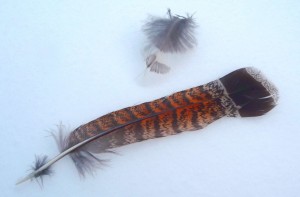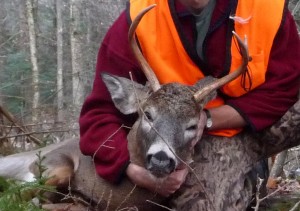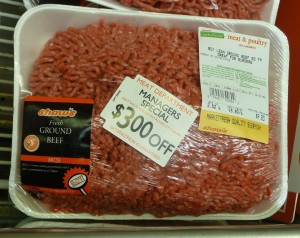First, a downy tuft. Then a barred tail feather. I scanned the path ahead and the woods to either side. Usually, when I find a few grouse feathers, there are more nearby, then more, then the spot where it happened.
This time, I did find more feathers, perhaps a couple dozen. But no epicenter.
One tail feather, caught a few feet off the ground among the snow-laden branches of a hemlock sapling, suggested a dramatic scene: a hawk or owl swooping, taking its prey on the wing—or off a branch above—and carrying it off for dinner. That’s how most ruffed grouse go, snatched by a raptor.
I sympathize with both hungry predator and wary prey, and am awed by both: the powerful strike of one bird, the subtle camouflage and evasive maneuvers of the other.
These kinds of predatory encounters happen all the time—birds, bugs, fish, amphibians, reptiles, and mammals eating each other constantly. Yet, in our daily lives, we rarely see such nutritional transactions. And in our animated films—pale, distorted parables of nature that they are—animals rarely eat; miraculously, predators and prey become buddies.
It’s easy to forget about all the eating. Like the raptor swooping overhead, prey in talons, it hardly touches the ground of our consciousness.
When our thoughts do turn to nature and eating and humans, we know where we stand. At the top. You’ve probably seen the slogan on T-shirts and bumper stickers: “I Didn’t Claw My Way to the Top of the Food Chain to Eat Vegetables.”
It’s quite a fantasy—linear, neatly avoiding the cyclical truth of our own mortality. For we, too, are part of nature. We’re like the large carnivores who “in the end,” as Paul Shepard once put it, “are pursued by microbes, fungi, and plant roots.”
If you stop to think about it, there’s beauty here. The nutrients of our bodies becoming part of field, forest, and stream. Perhaps part of grouse or hawk, or drawn up into the stem and needles of the small hemlock where the grouse feather alights.
Omnivorous predator though I am, I think the T-shirt should read: “I Clawed and Clawed But Couldn’t Escape the Food Web – Soon I’ll Be Feeding Vegetables.”
© 2010 Tovar Cerulli

 “I don’t mind,” he said and nodded toward his wife, to whom he was about to pass the serving bowl. She did mind.
“I don’t mind,” he said and nodded toward his wife, to whom he was about to pass the serving bowl. She did mind. But here’s the thing. I know other people—some of them near-vegetarians—who won’t eat any meat except wild game. Or who will only eat meat—wild or domestic—if they know how the animal lived and died.
But here’s the thing. I know other people—some of them near-vegetarians—who won’t eat any meat except wild game. Or who will only eat meat—wild or domestic—if they know how the animal lived and died.